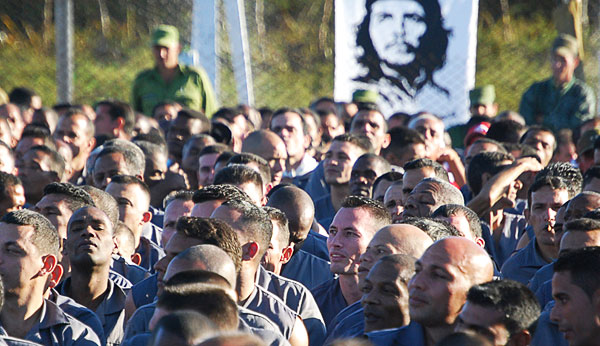Justice must not be blind
By Fernando Ravsberg (BBC)
Dec. 29, 2011 (11:24 PM)
Inmates in a Cuban prison for a cultural event. (Photo: Raquel Perez)
Just hearing the news of the pardon of 2900 prisoners a revolutionary friend warned me that “the street is going to be bad” and dissent lamented that “the decision of the government of Cuba has been so limited.” The controversy sparked my interest and went to look for those released.
Having talked a while with 3 of them do not give me any statistic but it’s enough to make me think that not necessarily all of these men and women come out to the street to repeat the crimes done in the past.
I was also used to wonder how far it is just to keep locked up a man of 36 years, married and become the prison Technician “A” power of assemblies, for a crime he committed when he was an adolescent of 17 years.
Surely some of those pardoned will not re-enter society and return to crime but that can not serve as an argument to be denied to all others the chance to have a second chance.
Is that prisons should not be used as punishment but as a place of confinement for those who are unable to live in society without harming the rest. Under this criterion does not justify keeping them behind bars when they are not dangerous.
It’s very healthy that each year the authorities are forced to review the cases of people who were once placed in their custody to serve a sentence, men and women we never be denied the right to rehabilitation.
At Christmas 2900 release of this add up to 200 political prisoners released since Raul Castro assumed the presidency and in the same account should include the commutation of death to tens of conviction.
Would be a first step towards the elimination of capital punishment because it is a penalty no turning back even if justice is wrong. It is also a cruel punishment that denies human beings the opportunity to rectify.
I know that my opinion is not shared by many Cubans, street interviews on the topic most men and women with whom I spoke were in favor of maintaining the death penalty for serious crimes.
Anyway, the Members raised the need to revise the Cuban penal code and I imagine this will be one of the items on its agenda but certainly not unique because the challenges facing society today are enormous.
Although Raul Castro’s insistence on the need to pursue stock theft, the penalty for this crime should not be higher than that applied to those that killed dozens of mentally ill from hunger and cold.
If, as the president said in Parliament, the main enemy of the nation is the white-collar corruption, it seems logical armed with a strategy and a legal structure that allows them to fight harder and efficiency.
How much have you lost the country with robberies in civil aviation, nickel, cigars, phone, food, biotechnology, transportation and spare parts, sugar and even within some companies run by the military?.
The truth is that within a year of criminal activity, any of these leaders and officials arrested has done much more damage to the national economy which could make a cattle rustler Cuban sacrificing all his life.
If the government does not cut such a drain of little use to the Cubans raise the productivity of your work, use less electricity or fail to receive funding. The sacrifices of the people end up in private accounts abroad.
In Parliament, the president called “corrupt bureaucrats,” he said in positions “to accumulate wealth, betting on an eventual defeat of the Revolution” and warned that “we will be relentless” with that “parasitic plague.”
In the same speech announced that there are documentaries and interviews filmed at “white-collar criminals,” but these can only be seen by MPs and other leaders, denying the possibility for most citizens.
Can people be asked to understand the gravity of what happens when you hide most of the information? Is it right to maintain secrecy on an issue that affects the entire nation? Will you come back the national media to shut up as if nothing happened?
It has been learned, few of these cases have a connotation that affect national security. The silence only serves to keep people passive in the stands echoing rumors, some true and others crazy.
The lack of transparency in fighting corruption seems to agree with Cuban writer Lisandro Otero when it concluded that under capitalism the citizen does not know what will happen while socialism never finds out what had happened.
La justicia no debe ser ciega
Por Fernando Ravsberg (BBC)
Dec. 29, 2011 (11:24 AM)
Reclusos en una prisión cubana durante un acto cultural. (Foto: Raquel Pérez)
Apenas se supo la noticia del indulto de 2900 presos un amigo revolucionario me advirtió que “la calle se va a poner mala” y la disidencia lamentó que “la decisión del gobierno de Cuba haya sido tan limitada”. La controversia despertó mi interés y salí a buscar a los excarcelados.
Haber conversado un rato con 3 de ellos no me da ningún parámetro estadístico pero es suficiente para hacerme pensar que no necesariamente todos estos hombres y mujeres saldrán a la calle a repetir los delitos que realizaron en el pasado.
Me sirvió también para preguntarme hasta qué punto es justo mantener encerrado a un hombre de 36 años, casado y convertido en la prisión en Técnico “A” en electricidad de montajes, por un delito que cometió cuando era un adolecente de 17 años.
Seguramente algunos de los indultados no podrán reinsertarse en la sociedad y volverán a delinquir pero eso no puede servir como argumento para que se les niegue a todos los demás la posibilidad de tener una segunda oportunidad.
Es que las prisiones no deberían servir como castigo sino como lugar de reclusión para aquellos que son incapaces de vivir en sociedad sin hacer daño al resto. Bajo ese criterio no se justifica mantenerlos tras las rejas cuando ya no representan un peligro.
Es muy sano que cada año las autoridades se vean obligadas a revisar los casos de las personas que un día fueron puestos bajo su custodia a cumplir una sentencia, hombres y mujeres a los que nunca se les puede negar el derecho a la rehabilitación.
A los 2900 liberados de esta Navidad se suman los 200 presos políticos excarcelados desde que Raúl Castro asumió la presidencia y en esa misma cuenta se debería incluir la conmutación de la pena de muerte a decenas de condenados.
Ojalá sea un primer paso hacia la eliminación de la pena capital porque se trata de una sanción sin marcha atrás aun cuando la justicia se equivoque. Además es un castigo cruel que le niega al ser humano la posibilidad de rectificar.
Sé que mi opinión no es compartida por muchos cubanos, en entrevistas callejeras sobre el tema la mayoría de los hombres y mujeres con los que hablé se mostraron favorables a mantener la pena de muerte para los casos de delitos graves.
De todas formas los diputados han planteado la necesidad de revisar el código penal cubano e imagino que este será uno de los puntos de su agenda aunque seguramente no el único porque los retos que enfrenta la sociedad hoy son enormes.
A pesar de la insistencia de Raúl Castro sobre la necesidad de perseguir el robo de ganado, la pena por este delito no debería ser superior que la que se aplicó a aquellos que provocaron la muerte de decenas de enfermos mentales por hambre y frío.
Si, como afirmó el presidente en el Parlamento, el principal enemigo de la nación es la corrupción de cuello blanco, parece lógico armarse de una estrategia y un andamiaje legal que les permita combatirla con mayor dureza y eficiencia.
¿Cuánto ha perdido el país con los robos en la aviación civil, níquel, habanos, telefónica, alimentación, biotecnología, transporte y piezas de repuesto, azúcar e incluso dentro de algunas empresas regentadas por las Fuerzas Armadas?.
Lo cierto es que en un año de actividad delictiva, cualquiera de estos dirigentes y funcionarios detenidos ha hecho mucho más daño a la economía nacional que el que podría hacer un cuatrero cubano sacrificando vacas durante toda su vida.
Si el gobierno no corta semejante sangría de poco servirá que los cubanos de a pie eleven la productividad de su trabajo, gasten menos electricidad o dejen de recibir subvenciones. Los sacrificios de la gente terminarán en cuentas particulares en el extranjero.
En el Parlamento el presidente los llamó “burócratas corrompidos”, aseguró que ocupan cargos “para acumular fortunas, apostando a una eventual derrota de la Revolución” y advirtió que “seremos implacables” con esa “plaga parasitaria”.
En el mismo discurso anunció que hay documentales e interrogatorios filmados a “delincuentes de cuello blanco”, sin embargo, estos solo podrán ser vistos por los diputados y otros dirigentes, negándole esa posibilidad a la mayoría de los ciudadanos.
¿Puede pedírsele a la gente que entienda la gravedad de lo que sucede cuando se le oculta la mayor parte de la información? ¿Es correcto mantener el secretismo en un tema que afecta a toda la nación? ¿Volverán los medios nacionales a callar como si nada pasara?
Por lo que ha trascendido, pocos de estos casos tienen una connotación que afecte la seguridad nacional. El silencio solo sirve para que la gente permanezca pasiva en las gradas haciéndose eco de rumores, algunos ciertos y otros disparatados.
La falta de trasparencia en el combate contra la corrupción parece dar la razón al escritor cubano Lisandro Otero cuando concluyó que en el capitalismo el ciudadano no sabe qué es lo que le pasará mientras que en el socialismo nunca se entera de qué fue lo que pasó.
Por Fernando Ravsberg (BBC Mundo)
Dec. 29, 2011 (11:24 PM)
La Justicia No Debe ser ciega/ TheCubanHistory.com



 Cartas Desde Cuba
Cartas Desde Cuba
